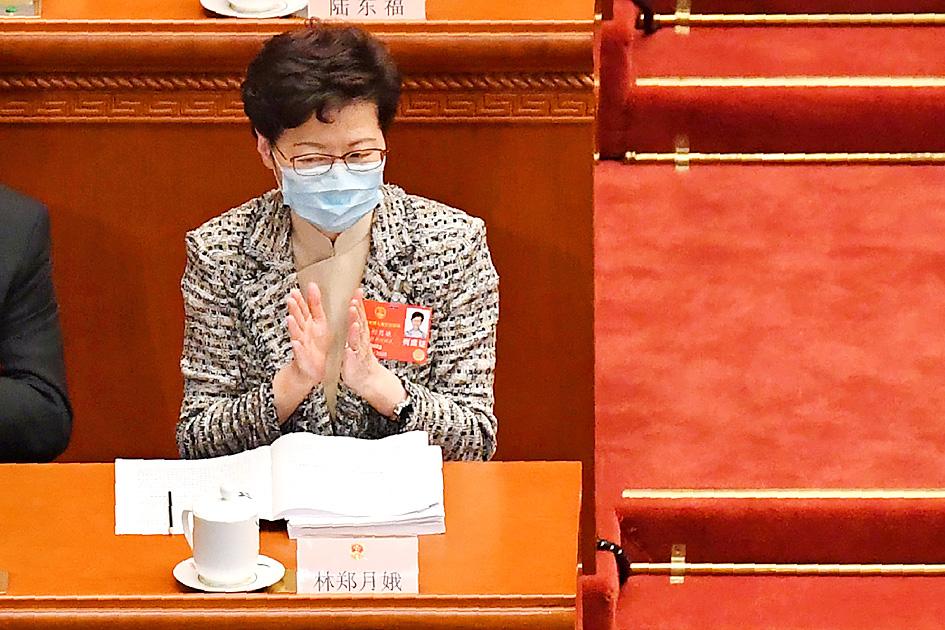The government and the Chinese Nationalist Party (KMT) yesterday both spoke out against plans by the Chinese government to enact a national security law in Hong Kong.
Chinese officials yesterday confirmed that the National People’s Congress would review a bill “on establishing and improving the legal system and enforcement mechanisms for the Hong Kong Special Administrative Region to safeguard national security.”
The Presidential Office said that the announcement was evidence that the “one country, two systems” framework fundamentally clashes with democratic freedoms.

Photo: AFP
The de-escalation of tensions between Hong Kong and Beijing relies on the Chinese government’s willingness to respond to Hong Kongers’ demands, and to establish elections for Hong Kong Legislative Council members and the chief executive, Presidential Office spokesperson Alex Huang (黃重諺) said.
Executive Yuan spokesman Ting Yi-ming (丁怡銘) quoted Premier Su Tseng-chang (蘇貞昌) as saying that the bill would break the Chinese Communist Party’s promise that it would guarantee Hong Kong 50 years of autonomy, seriously compromising Hong Kongers’ democratic freedoms.
Beijing’s announcement would only stoke Hong Kongers’ discontent and increase social instability, the Mainland Affairs Council said, adding that the move might undermine Hong Kong’s status as an international financial center.
Beijing cannot comprehend that the source of dissent and unrest in Hong Kong is not so-called “foreign influence” and the pro-democracy movement, which is why it is emphasizing a legislative solution to such perceived threats, it said.
The government should be the people’s protector, not their jailer, it added, calling on Beijing not to sow further chaos in Hong Kong.
The Democratic Progressive Party said that if the legislation passes, it would change Hong Kong’s fate forever.
“It is more than trampling on Hong Kong’s democratic form of government. It is telling the world that the ‘one country, two systems’ concept is dead,” the party said.
Beijing’s announcement, if carried through, would not win the hearts and minds of Hong Kongers, nor would it win Beijing any sympathy in the international community, it added.
The KMT said that Beijing should be careful, as the proposed legislation would hit a raw nerve with Hong Kongers.
Hong Kong’s autonomy, freedom of speech and freedom of assembly should be respected and upheld, it said, calling on Beijing to allow elections for Legislative Council members and the chief executive.
The Republic of China is an independent, sovereign nation and rejects the “one country, two systems” framework, the KMT added.
“Beijing’s handling of the Hong Kong situation concerns not only the fortune of Hong Kongers, but could also affect the development of the Chinese mainland area, as well as the direction of cross-strait relations,” the KMT said, calling on Beijing to constructively address Hong Kongers’ concerns and meet their expectations.
Additional reporting by Sean Lin

CHAOS: Iranians took to the streets playing celebratory music after reports of Khamenei’s death on Saturday, while mourners also gathered in Tehran yesterday Iranian Supreme Leader Ayatollah Ali Khamenei was killed in a major attack on Iran launched by Israel and the US, throwing the future of the Islamic republic into doubt and raising the risk of regional instability. Iranian state television and the state-run IRNA news agency announced the 86-year-old’s death early yesterday. US President Donald Trump said it gave Iranians their “greatest chance” to “take back” their country. The announcements came after a joint US and Israeli aerial bombardment that targeted Iranian military and governmental sites. Trump said the “heavy and pinpoint bombing” would continue through the week or as long

TRUST: The KMT said it respected the US’ timing and considerations, and hoped it would continue to honor its commitments to helping Taiwan bolster its defenses and deterrence US President Donald Trump is delaying a multibillion-dollar arms sale to Taiwan to ensure his visit to Beijing is successful, a New York Times report said. The weapons sales package has stalled in the US Department of State, the report said, citing US officials it did not identify. The White House has told agencies not to push forward ahead of Trump’s meeting with Chinese President Xi Jinping (習近平), it said. The two last month held a phone call to discuss trade and geopolitical flashpoints ahead of the summit. Xi raised the Taiwan issue and urged the US to handle arms sales to

BIG SPENDERS: Foreign investors bought the most Taiwan equities since 2005, signaling confidence that an AI boom would continue to benefit chipmakers Taiwan Semiconductor Manufacturing Co’s (TSMC, 台積電) market capitalization swelled to US$2 trillion for the first time following a 4.25 percent rally in its American depositary receipts (ADR) overnight, putting the world’s biggest contract chipmaker sixth on the list of the world’s biggest companies by market capitalization, just behind Amazon.com Inc. The site CompaniesMarketcap.com ranked TSMC ahead of Saudi Aramco and Meta Platforms Inc. The Taiwanese company’s ADRs on Tuesday surged to US$385.75 on the New York Stock Exchange, as strong demand for artificial intelligence (AI) applications led to chip supply constraints and boost revenue growth to record-breaking levels. Each TSMC ADR represents

State-run CPC Corp, Taiwan (CPC, 台灣中油) yesterday said that it had confirmed on Saturday night with its liquefied natural gas (LNG) and crude oil suppliers that shipments are proceeding as scheduled and that domestic supplies remain unaffected. The CPC yesterday announced the gasoline and diesel prices will rise by NT$0.2 and NT$0.4 per liter, respectively, starting Monday, citing Middle East tensions and blizzards in the eastern United States. CPC also iterated it has been reducing the proportion of crude oil imports from the Middle East and diversifying its supply sources in the past few years in response to geopolitical risks, expanding